From Mythology to the MCU: Egyptian and Norse
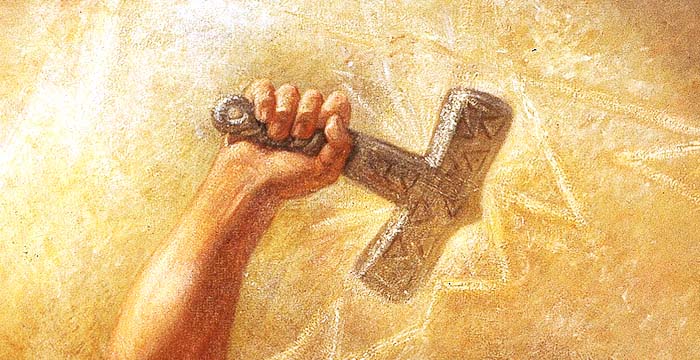
The success of the Disney limited series Moon Knight has thrown Egyptian mythology into the spotlight. The Marvel Cinematic Universe is no stranger to portraying gods: we previously saw characters from Norse mythology in the Thor movies. Thor and Loki crossed over into the Avengers movies, and Loki got his own series.
The ancient Nordic people and ancient Egyptians told their myths to explain aspects of the natural world and impart wisdom. These stories became famous parts of history, and they have been used as inspiration for many stories. Of course, each time the stories are retold, details may change to fit what the storytellers wish to say. By analyzing what details changed for the Marvel films, we may find special insights into the stories of these movies and shows.
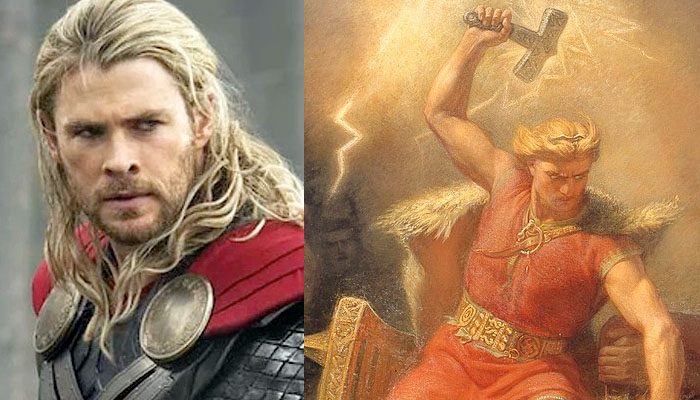
Before we begin, a quick disclaimer: this will be different from comparing the Captain America movie to the real-life historical events of World War II. The canon of some ancient myths can be hard to pin down, which is why it is often easy to make changes for retellings and adaptations. In addition, these myths have already been retold in Marvel Comics, which occasionally has its own canon inconsistencies, before being retold again for the films and TV shows. Sources may vary, and that is okay.
The Falcon
In Marvel’s Moon Knight, Oscar Isaac plays Marc Spector, the avatar of Khonshu, Egyptian god of the night sky. Khonshu sends Spector to violently punish people who have done evil acts, and he does not give Spector much choice in the matter. He threatens to take Spector’s wife as his avatar if Spector disobeys or fails him. His motivation is justice, although he is willing to take extreme measures to carry it out.
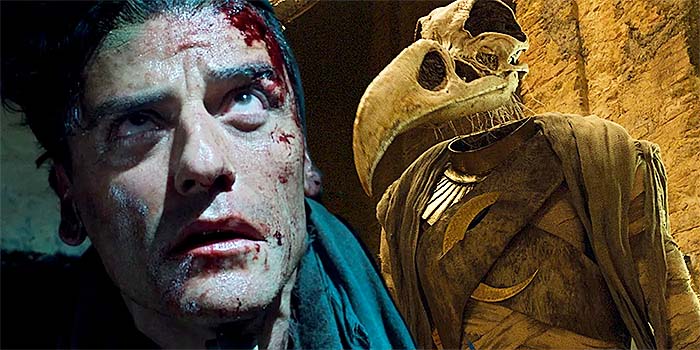
The differences between this Khonshu and the god of ancient Egyptian mythology begin with his name: it was traditionally spelled Khonsu. As a moon god, Khonsu was believed to affect the fertility of humans and livestock and provide healing. He was only portrayed as violent in early mythological accounts, such as “the more terrifying Pyramid Texts”. 1
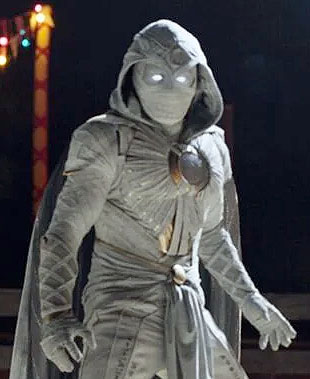
The most likely reason Khonshu was made more aggressive for the show is to explain why he grants his avatar powers like super strength rather than magical healing – Moon Knight seems to magically heal his own wounds but not the injuries of others. Perhaps Marvel’s writers think healing other people would be a less interesting superpower. The ability to heal his allies may have been more appropriate if he spent more time on superhero teams, but Moon Knight is predominantly a solo act.
In Moon Knight, Khonshu is an outcast among the Egyptian gods. He hesitates to call on them for help, and when he does, the gods do not take his concerns seriously. This lack of respect is quite different from how Khonsu was treated in Egyptian mythology. The god of the moon and time was instrumental in the Egyptian creation myths; he was “the serpent who fertilized the Cosmic Egg from which creation burst forth”. 2
Again, Moon Knight is usually a solo vigilante, often compared to Batman from DC Comics. For the show, making Khonshu a pariah in his own society helps support the individualism of the hero connected to him. It helps explain why Moon Knight is a mostly unknown player in the larger Marvel Cinematic Universe who does not interact with other superheroes, like Thor.
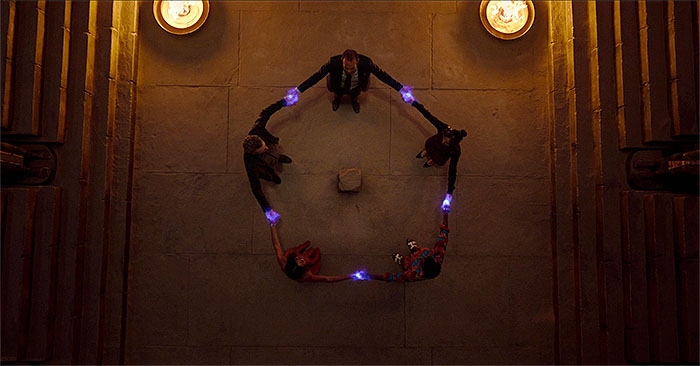
In ancient Egypt, pharaohs were believed to be the avatars of gods, primarily Ra and Horus. Mythology does not depict other gods, such as Khonsu, taking humans as avatars, but the Marvel show suggests that all the major Egyptian gods do this. This differentiates Egyptian myth-inspired superheroes from other god-powered superheroes like Thor and Hercules; Khonshu is more like an otherworldly spirit empowering a human body than a space alien crash landing on Earth.
The Crocodile
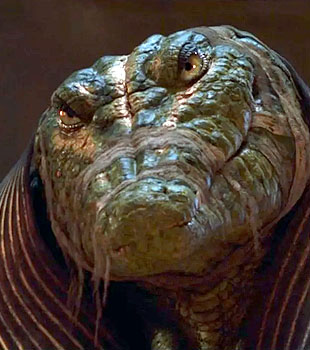
The other Egyptian god who prominently appears in Moon Knight is Ammit, a goddess of divine retribution. In the show, Ammit seems to be motivated by justice, like Khonshu, but she claims to foresee the bad things people have yet to do, and she judges them with preemptive execution. The other Egyptian gods considered this unfair and imprisoned Ammit, but a cult of Ammit worshippers conspire to release her, at which point she becomes a giant half-crocodile monster and begins raining down indiscriminate divine wrath.
All this makes for a compelling supervillain plot, but it is only loosely based on the original myths of Ammit. In ancient Egypt, “Ammit was never worshipped, and was not strictly a goddess… although she was referred to as a demon, she was in reality a force for order” called upon to judge humans who failed the test administered by the real death gods (Ancient Egypt Online). If a human’s heart was determined to be heavier than a special feather, Ammit would devour it. According to these myths, Ammit would never try to punish a person before they had died, let alone before they had even committed a sin worthy of judgment.
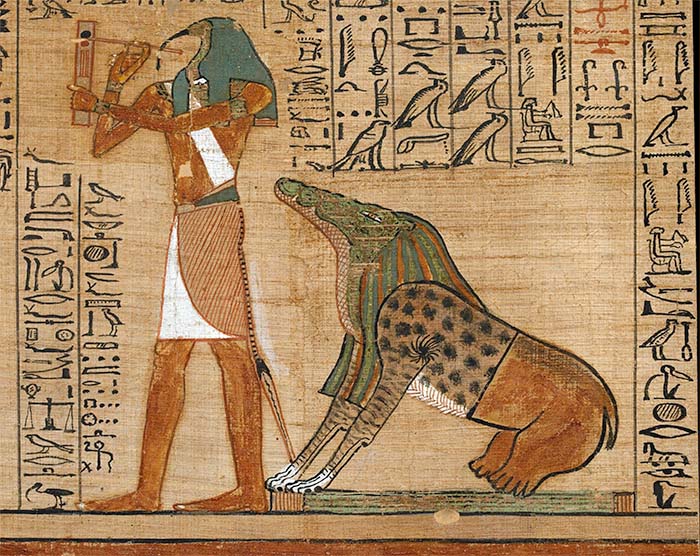
With this in mind, Ammit may seem like an odd choice for a supervillain, but she represents humanity’s significant fear of judgment for our transgressions. She also represents the human wish that people had been stopped before committing terrible acts. Audiences can understand why this new Ammit would have followers who want to help her gain power, partially out of fear.
Egyptian mythology has some gods of chaos and destruction that would be more logical choices for supervillains, but Ammit is a more appropriate villain for Moon Knight, specifically. Marc Spector’s internal struggle involves a traumatic childhood and a lot of guilt. Personal, psychologically manipulative villains like Ammit and her lead follower, Arthur Harrow, make better antagonists for him than a chaos god.
The Hippo

Taweret, patron goddess of mothers and children, also makes an appearance in Moon Knight. In mythology, she was notable for looking like an aggressive hippo but acting like a kind midwife to help mothers with childbirth. “She was associated with the lion, the crocodile, and the hippo, all animals that were feared by the Egyptians but also highly respected”. 3 In the show, this translates to a cute, high-pitched voice and an awkward personality coming from a frightening hippo person. However, this is where the similarities end.
In the show, Taweret plays the role of guide into the Duat, the Egyptian underworld. This is very unexpected, considering she is traditionally associated with birth, not death, and Anubis is supposed to be the guide to the underworld. Taweret also steals Anubis’ heart-weighing ritual and pilots a boat that’s usually reserved for the sun god and Egyptian royalty.
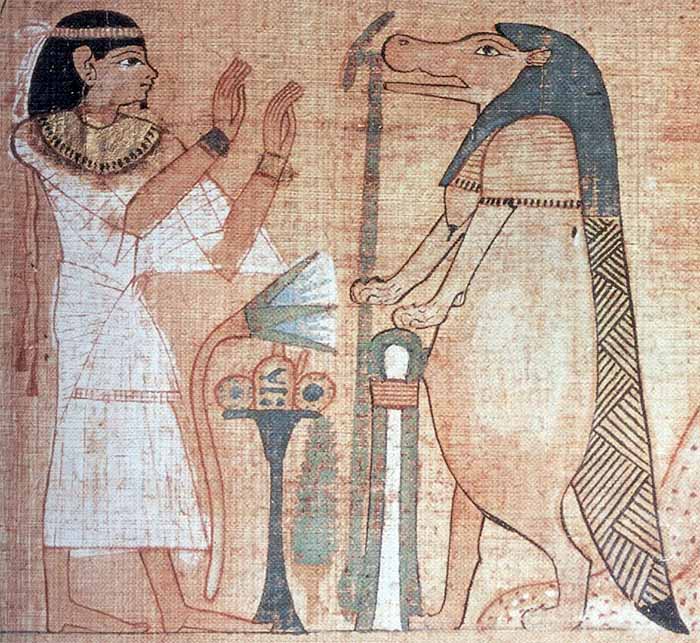
Presumably, Taweret is used in the show for shock value and comic relief. If Anubis had been there, playing his traditional role, his god of death aesthetic may have brought down the vibe of an already thematically dark show. Khonshu and Ammit offer enough serious tone; it is somewhat uplifting to see a kinder and more positive Egyptian goddess.
In summary, the gods in Moon Knight are very different from the Egyptian gods they are based on. One potential reason is – although Egyptian mythology is full of exciting imagery like mummy wrappings and monstrous animal-human hybrids – the original storylines might not make for very interesting superhero stories. Changes are added to adaptations to hold audience interest.
Dwarves and Elves
Norse mythology, on the other hand, is ripe with stories perfect for superhero stories. Thor and his fellow Asgardians were believed to be warriors frequently fighting giants and other monsters. Loki was, indeed, a god of mischief and a frequent antagonist in the Norse myths. Yet there are some details the Marvel movies changed a bit.
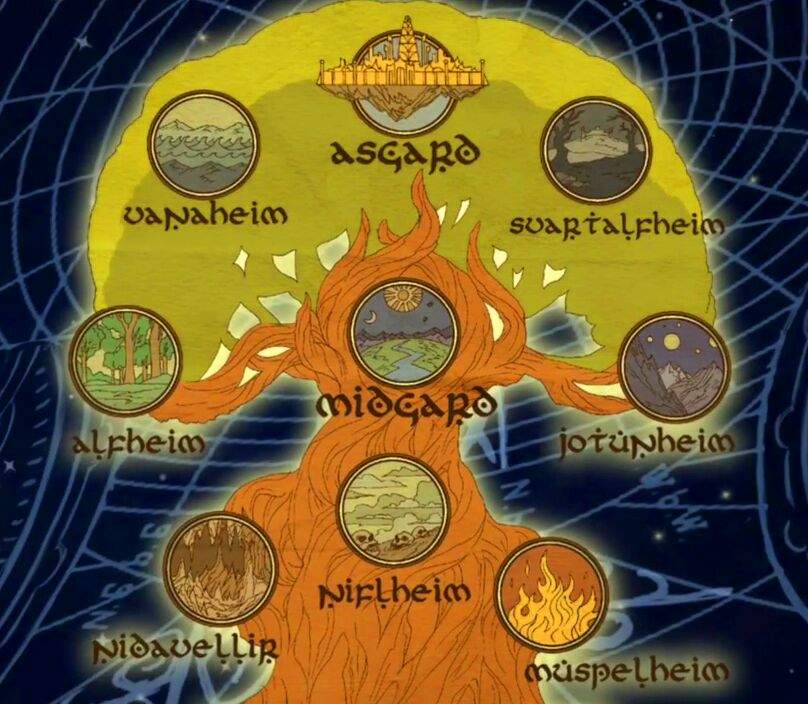
From the perspective of Thor and the Asgardians, Earth, aka Midgard, is one of nine realms connected by ethereal bridges like the branches of a tree. Thor’s father, Odin, rules these realms from their home, Asgard. Enemies of Asgard include the frost giants of Jotunheim and the fire giants of Muspelheim. All this is translated fairly consistently from Norse mythology to the Marvel movies.
The changes begin with a realm the movies call Svartalfheim. This is a realm of darkness inhabited by dark elves. In Thor: The Dark World, the dark elves’ ruler, Malekith, desires to cover the other realms in darkness and rule them all. This is all to be expected from a superhero story; the problem is it has almost no basis in Norse mythology at all.
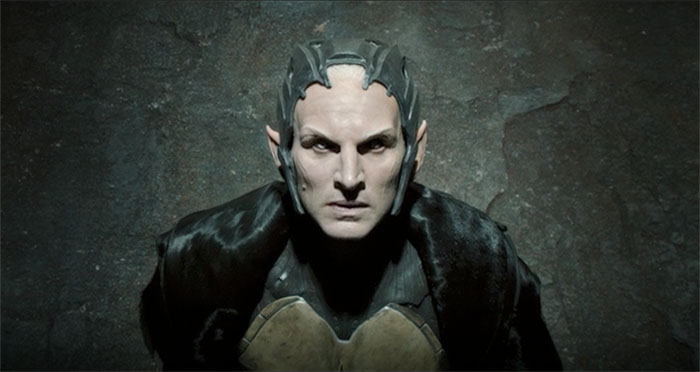
In the Norse myths, dark elf and black elf were alternative names for dwarves. Svartalfheim, the dwarves’ home realm, was more often called Nidavellir. These dwarves acted much like one would expect of fantasy dwarves: they mined in underground caves and crafted things in forges. 4 They were definitely not as antagonistic as the dark elves in Thor: The Dark World.
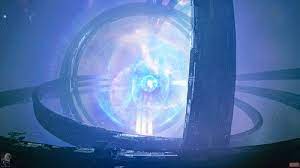
To further complicate this issue, Avengers: Infinity War introduces dwarves and Nidavellir as completely separate from the dark elves of Svartalfheim. The movie’s Nidavellir seems more like a science fiction setting than its mythological counterpart, but it is still much closer to the myths than the realm of darkness fabricated for The Dark World.
The movies also combined Niflheim, the realm of mist and primordial ice, with Helheim, the underworld and home of Hel, goddess of death. The most likely reason for all this rearranging is that details about the nine realms in the original Norse myths were often unclear. There was some room for embellishment, and Marvel took the opportunity to create a new antagonist for Thor.
The God of Mischief

Thor’s main antagonist throughout the Marvel Cinematic Universe is his brother, Loki, the god of mischief. Loki was originally a frost giant; Odin took him from Jotunheim as an infant and raised him to believe he was the younger son and, potentially, an heir to the throne. Loki’s discovery of the truth was the impetus for his shift to villainy. After multiple attempts to conquer through trickery or force, Loki eventually begins to redeem himself and becomes an ally to Thor.
The original Norse myths about Loki have numerous differences. First of all, he joined Asgard as an adult, not a baby. He was closer to Odin’s brother than his adopted son, and his rivalry was primarily with Heimdall, the gatekeeper of Asgard who was always bitter about the frost giant who was allowed to walk right past him.
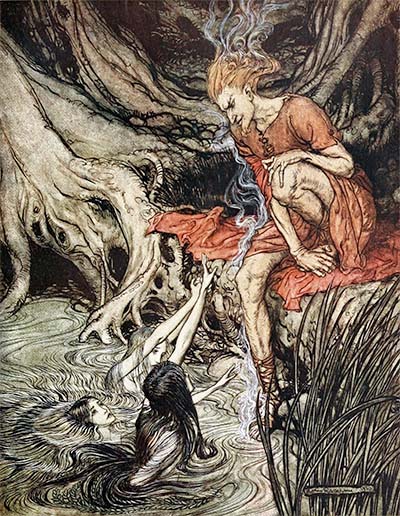
By making him Thor’s brother, Marvel gave Loki a backstory of constantly feeling overshadowed by Thor. This sets him up to be the natural antagonist to Thor and makes his redemption arc believable and understandable. Thor is continually trying to convince Loki to stop being a villain and be his brother and ally again, and it seems to work in Ragnarök.
In the myths, Loki had no redemption arc. He was sometimes on the Asgardians’ side, but only ever in his own mischievous way, continually defying the expectations of a god of Asgard. While most Norse gods solved problems with bravery and strength, Loki used deception or playfulness, earning him a reputation as “a scheming coward who cares only for shallow pleasures and self-preservation”. 5
In addition, Loki’s crimes against Asgard far outweighed any help he provided. He was almost entirely responsible for the death of Balder, the god of light, the most well-loved of all the Asgardians. He was prophesied to fight against the gods in the climactic, apocalyptic battle of Ragnarök – Loki’s actions in the Ragnarök movie decidedly do not match the mythology.
Loki gets a redemption arc in the Marvel movies because writers decided it made sense for his character. By changing his backstory to make him closer to Thor, they made him more sympathetic. Combining this with Tom Hiddleston’s iconic performance, audiences are always happy to see Loki return, even if he appeared to die in his previous appearance. With even more appearances than some of the Avengers, Loki was bound to grow as a person, from sympathetic villain to anti-hero.
The Goddess of Death
Loki’s other role in Norse mythology was producing strange offspring. Two of his children were Fenrir the wolf and Hel the goddess of death. Both of these characters appear in Thor: Ragnarök, but there is no connection to Loki. In fact, Hela (another case of Marvel changing a name’s spelling) is Odin’s daughter in the movie. As with Loki, this change helps Hela fit the role of an antagonist for Thor to fight.
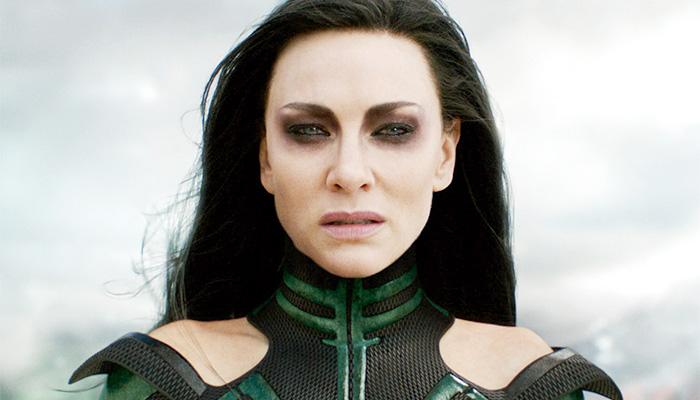
In addition to her parentage, Hela has many other differences from her mythological counterpart. In the backstory of Thor: Ragnarök, Hela was Odin’s executioner and a wielder of Mjolnir, the hammer that later became Thor’s signature weapon. She grew too ambitious and tried to rebel against her father, so Odin banished her and maintained the lie that she had never existed until the day he died.
Hela draws strength from Asgard itself, making her far too powerful for even Thor to fight. She can summon a seemingly endless number of blades and throw them with deadly accuracy, slaughtering multiple armies singlehandedly. She can also animate an army of undead soldiers for the battles she doesn’t want to fight herself.
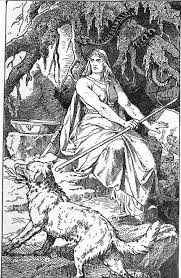
The Hel of Norse mythology had almost none of these characteristics. The myths didn’t say much about her, but they did describe her as “rather greedy, harsh, and cruel, or at least indifferent to the concerns for both the living and the dead” – certainly the personality of a villain. 6 But the original Hel guarded the underworld; she never showed interest in expanding her domain or conquering any of the other realms. And although she was no doubt a warrior, like most Norse gods and goddesses, she wasn’t said to have aggressive powers like throwing blades or commanding undead soldiers.
For the movie, Hela gained an overabundance of ambition and power to make her even more threatening than Loki. Thus, she replaced Loki as Thor’s more villainous sibling. These changes were necessary for the story – Thor needed to face an unbeatable threat for his own character development in the story.
The Twilight of the Gods
By naming the third Thor movie Ragnarök, Marvel drew an explicit comparison to one of the most significant stories in Norse mythology. The Norse myths came complete with prophesies of how the world would end, including detailed descriptions of how the gods would die in battle. The Marvel movie takes significant liberties with this myth.
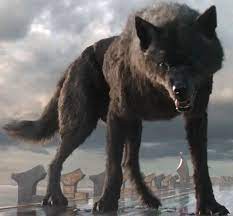
The movie introduces Fenris the wolf, who was fated to appear in Ragnarök, but the myth said Fenrir (spelled differently) would kill Odin. In the movie, Odin apparently dies of natural causes, which would have been considered unthinkable by the Vikings who worshipped him as a warrior god.
Odin is only one of the gods who died in the myth of Ragnarök. Heimdall and Loki were prophesied to die by shapeshifting into leopard seals and tearing each other apart. Thor was destined to kill the Midgard Serpent, only to die from the Serpent’s venom. 7
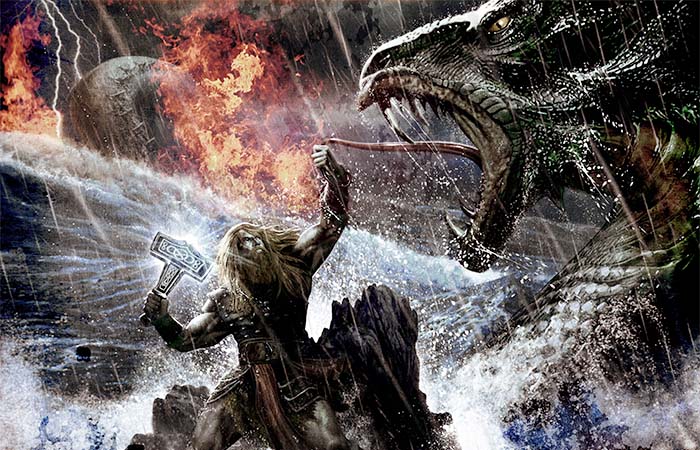
Although many Asgardian characters die in the Ragnarök movie, Heimdall, Loki, and Thor all defy their mythological destinies and survive. Fate catches up with Heimdall and Loki when they die in the opening scene of their next movie, but Thor is still alive three movies later.
The reason Thor survives in the movie is pretty easy to understand: he’s the hero. Heroes have died in the Marvel Cinematic Universe, but not in their solo movies. That’s not how these superhero movies work. In a way, Thor’s fate in the movies is worse than his fate in the myths: he survives but loses his entire family and most of his friends. This survivors’ trauma shapes his actions in all his following movie appearances.
Marvel’s changes to Norse mythology are more understandable than the changes to Egyptian mythology. Fans of the original myths can more easily accept Marvel’s versions of the stories of Thor, Loki, and Ragnarök. This is because the Norse legends easily lend themselves to superhero stories. The Vikings believed in brave warriors fighting monsters as their role models, while the Egyptians told stories about messy family politics to reflect the politics of their pharaohs’ dynasties.
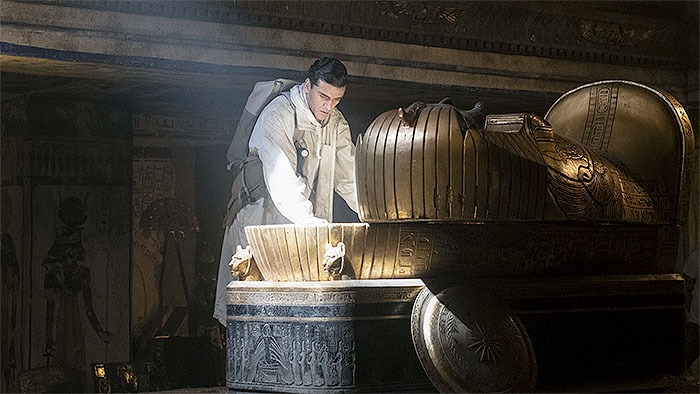
On the other hand, the success of Moon Knight may inspire viewers to research Ancient Egypt themselves. Egyptian mythology is notable for being intertwined with Egyptian history, and stories inspired by Egyptian myths often involve archaeological mysteries – Moon Knight is no exception. The exciting imagery may be all that’s required to draw audience interest; details of the gods’ personalities are less important.
A common motif in Marvel’s movies and TV shows is humans achieving feats of heroism and power previously reserved for gods of legend. Mere mortals can fight alongside Thor or fight against the divine retribution of Ammit. They become the heroes of modern myths, and they fulfill one of the same purposes as ancient myths: inspiring everyone else to try to be heroes, too.
Works Cited
- Gods and goddesses. Ancient Egypt Online. (n.d.). Retrieved January 20, 2023, from https://ancientegyptonline.co.uk/thegods/ ↩
- Joe, J. (2022, April 7). Khonsu: The god of The night light and defender of night travelers. Timeless Myths. Retrieved January 20, 2023, from https://www.timelessmyths.com/mythology/khonsu/ ↩
- Ancient Egypt Online. ↩
- Norse Mythology for Smart People. (2019, February 8). Retrieved January 20, 2023, from https://norse-mythology.org/ ↩
- Ibid. ↩
- Ibid. ↩
- Ibid. ↩
What do you think? Leave a comment.











The best norse mythology version of Thor is on the Netflix Tv Series called Ragnarok with david stakton and so many norse mythology elements are in it like you see the axes, the mead, the lighting and thunder along with the Jotuns family which are giants posing as humans for thousands of years.
Got to agree with you on that, their depiction of Norse mythology is very nicely done.
Reading Norse mythology lead me to Marvel comics as a kid.
As a Swedish person, who have been educated in this mythology since I was a kid in school, it’s really fun to see Marvels take on Norse mythology.
Years ago, my dad told me that Alexander the Great was a Pharaoh, so he’s gonna have a brain blast when he watches Moon Knight.
I called the reveal of Alexander’s tomb just like MG. I was jumping off the couch and my siblings were looking at me like I’d lost my mind, lol
Creative liberties were taken with Moon Knight but it is a better representation of Egyptian Mythology. Infinitely better than the God’s of Egypt movie. We can only hope that it keeps getting better. Khonsu has falcon iconography along with his human one. And Khonsu is a child in his human iconography, so his childish self-centered personality kinda works. I just wish his skull head was more falcon than raven. It would have played into his predatory nature.
Great read as always. What is your favorite type of mythology?
Good question. I like different mythologies for different reasons. Greek myths have mortals achieving great things, a la Percy Jackson. Norse myths are fun because they feel like one big cohesive story with a beginning, a middle, and an end, and clearly defined conflicts.
I feel like they REALLY disrespected Odin in the MCU. Less fatherly love and more of an arse who somehow became a dad and that sucks.
This actually makes me very curious: do we just assume all these gods were literally believed in? Or were they the superhero characters of the day that people knew were just stories but still carried importance to them in their everyday lives?
Loki reminds me of the african Orixa (Orisha) Exu (Ayshoo) aka Legba or Exu Elegbara. Also a trickster that may do wonderful or evil deeds. Normally people don’t devote temples to him. There are other more powerful orixas to devote them too. Exu is not the richest or the stronger of them. But he must be celebrated and respected, otherwise you may be in trouble. So rituals devoted to him are celebrated in special days. I suspect that the same would apply to Loki, so you wouldn’t find a temple of Loki, but there would be images of him in other temples.
It’s so nice to see Moon Knight getting analysed! I binged it this summer and haven’t had time to still my thoughts on it but this was good and helpful!
One of my favorite parts of this show was Mr.Knight (Stevens version of Moon Knight) he is super funny and enjoyable to watch.
The beauty of myths, they were attempts to explain the nature around the old men, and the deep feelings within their heads and underneath their skulls.
I finished MK a few days ago, and now I want The Artifice’s kick-butt opinion! 😄
There is a stark difference from Stan Lees marvel thor made with love he’s smart powerful. Compared to mcu thor where he’s just a living clown and an idiot.
God of war Thor helps a lot to picture a more proper Thor (definitely not perfect though).
Ack, Moon Knight. I disliked how the six gods were bodied by the staff and Ethan, but I think there’s a good reason for it…or I just convinced myself there was to patch the holes but anyway, I don’t think the gods were actually there. I know that sounds weird, but you see multiple cases of the gods operating independent from their avatar, so perhaps they just weren’t there directly for the fight, yet; they were slightly ambushed. But wait, you may be asking about how Ethan had the power, especially while she was still trapped? Well, Ethan explains earlier that she imbued a good deal of her power, her life force even into the staff. Making the ambush a bit lopsided in Ethan’s favor, as he’s hitting them hard before they can really get powered up and ready. So with my reasoning it almost makes the scene believable, and helps me sleep at night.
Are there are parts of the mythology that make reference to Thor controlling and using Lightning? This is a significant part of the Marvel version of him but I can’t actually recall ever seeing tales about that in the mythos.
He was the god of thunderstorms, and of course lightning is a part of that. The myths were just about him slaying monsters with his hammer and his strength, sure, but people still believed every lightning bolt and thunderclap came from him.
My favorite story from Norse myth with Loki is the one with the giantess Skadi, she was mad the Aesir got her father killed and they offered her compensation and gifts, one of them being a good laugh, and Loki was the one who gave her that. He tied one end of a rope to the beard of a goat and the other end around his testicles and proceeded to have a tug-a-war match with it.
Indeed. That story demonstrated that Loki solved problems through trickery, while most of the other gods and goddesses were warriors.
Check out Neil Gaiman’s Norse Mythology. Great way of getting introduce to Nordic Mythology and also an easy entertaining read.
One thing interesting about Moon Knight. In the comics the different costumes of moon knight are actually two separate personalities. so there are 5 different personalities: Marc Specter, Steven Grant, Jake lockley, Moon Knight, and Mr. Knight.
I may not know a lot about the mythology but i know enough and tons about MK the marvel character himself and they got neither of them right as a whole the show is like a weak one.
I believed I stumbled into a series what gets Egyptian mythology right…Until I got to the boat…
Marvels loki and the original Norse loki are two different lokis. It’s not like a confirmed thing, it’s just the truth. they’re so different they just aren’t the same lokis
Marvel absolutely made a mess of the entire Norse world. Ever since I started reading about Norse mythology (s/o to Neil Gaiman) marvel to me is now just a big joke.
I’ve never watched Marvel (any), never will. I misunderstood Thor from what I learned in childhood as simply the thunder god or a hyper-masculine god of war, but as I learned more about him as a protector of mankind and a very “down-to-Earth guy”, he appeals to me more, probably among my “top 3” with Frigg and Balder.
How are the Egyptian gods in Marvel actually GODS, but the Norse gods in Marvel are just aliens? Not sure what’s going on there, but it seems a little weird.
Shang-Chi’s movie had some kind of pocket dimension full of Chinese spiritual beings. Doctor Strange’s movies heavily imply the existence of countless other dimensions full of weird creatures. The best explanation I can imagine is the Egyptian gods are from one of those spirit-dimensions, while Thor and all the other gods who show up in Thor: Love and Thunder are a special category of aliens with physical bodies.
Short answer: it’s comic book/movie logic. Don’t think too hard about it.
This. Also, one should Never expect for Marvel to do justice to the mythologies from which it borrows concepts or plot lines. They have tragically failed Thor and the Norse gods as entertaining as those comics and movies are.
These movies and books like the ones by Rick Riordan twist different myths so much that as adults it becomes hard to differentiate the origins from the reworks. Regardless, I love that Marvel dove into Norse and Egyptian mythology since traditionally, we only ever really got Greek and Roman myths in the mainstream media. The only other place Norse myths make an appearance are Viking shows and even those r minimal.
Omg I literally just binged Moon Knight and Loki last night! Very excited to read your perspective.
MCU Loki is the character who’s most mythology accurate.
Except Loki isn’t brother to Thor, instead he’s blood brothers to Odin which means Loki and Odin swore some kind of oath which makes them “metaphorically”(if that’s the right word) brothers.
Yeah, I know. There’s a lot of exceptions when it comes to the more or less physical stuff. But personality wise, I’d say, he’s one of the most fitting.
Definitely. He uses daggers and magic and clever words instead of swords and brute strength. It’s mainly his motivations that change; in the movies he’s basically a rebellious teenager who eventually gets better, while in the myths he commits wholeheartedly to the agent of chaos bit.
Marvel lost a precious chance to depict gods just as Mythology described them.
Loki is soooooo different in the MCU and I sorta hate how powered down he was and what a coward cry baby they made him. I’m writing a fantasy novel involving a lot of Norse and Celtic mythology and even a bit of Native American but I’ve done and am doing A LOT of research to try and make it as close as I can…but my main character who’s a demi-God she’s created by me and it was really fun designing my own God and how she fits into the actual lore.
Marvel took Norse mythology and altered it in such ways that it makes me kinda angry.
If you like Egyptian gods, watch the movie Gods of Egypt.
Not only did the Egyptians master mathematics and engineering to create one of the largest and most incredible wonders of the world, but they also managed to invent astronomy and build a surprisingly accurate explanation for the functions of the moon and the sun
LOKI from mythology much like all of the Norse mythos counterparts are way more OP than they are in the MCU. the comic depictions of ODIN & THOR & LOKI are very powerful but i’d still say the mythos versions are even more powerful than them. the ancient writings made them as powerful as their imaginations would allow.
I don’t like the MCU version of Thor that much, i like more the version seen in Avengers: Earth’s Mightiest Heroes because it’s a better version of Marvels Thor
The Marvel Thors were always lacking authenticity. Thor is fire and aggression. Marvel is more like Prince Valian Thor.
The movie version was more like Beowulf as Thor.
Wow, there’s a lot Egyptian mythology in Moon Knight.
Loki was basically just a looney tunes antagonist. He caused problems only to be comedicly walloped in the face by it later.
God of war video games accurately portrayed Norse History. Except Thor rode in a chariot run by two goats.
Loki is just the bard in a d&d party. Change my mind.
Could it be that stories about Loki were simply meant for children…
If you mean the comic book/movie versions, you’re probably right. All the myths would have been made more family-friendly to turn them into superhero stories, including making Loki more sympathetic and less villainous.
This was super interesting! Thank you!
It is very intriguing to se MCU stepping into egyption methdadology with the Moonknight, very excited to see how they will merge it in with upcoming titles like Kang Dynasty and Secret Wars
Loki is very similar to Satan in the Abrahamic religions…
The implication that Egyptian mythology/stories are not as widely accepted and must be reinterpreted/simplified is silly. MCU’s changes clearly do not understand the necessity for those complex political stories…
The MCU does not tell complex political stories. They tell superhero stories. Even Civil War was watered down for the movies.
Exactly. Watering down these stories for mass media distribution and consumption is frankly misleading.
I’m a fan of the MCU and how it’s inspired more elaborate, long-form nonlinear storytelling, but I think with the introduction of Zeus and Hercules in Thor: Love & Thunder (a mess of a movie) that they’re beginning to walk a fine line between storytellers and story-scavengers. I understand the use of norse mythology in the comic books. In fact, I think it’s a smart way to bring “real-world” heroes together with fictional ones, but the MCU is beginning to expand so wide that finding strong, well-articulated content is like finding a needle in a haystack.
This was such an interesting read. I have always been fascinated by mythology so was really excited woth the way that the MCU approached different myths even with creative liberties. Now they have even introduced aspects of Aztec/mesoamerican mythology with Namor in Wakanda Forever.
As thankful as I am to have been properly (if maybe not formally) introduced to Norse mythology through the MCU and Thor, I’m glad it opened my eyes to other mediums and texts that better and more accurately cover the topic.
This is so nerdy! I loved it. I think you made a really important point in your conclusion. I haven’t studied any Norse myths academically unless you count, like, Beowulf, but in the myths I have looked at the throughline seems to be that they inspire regular people to act in a certain way. I think the superhero genre wouldn’t exist without myths like these. I couldn’t agree more that superhero stories are :modern myths”.
With Marvel taking on Norse and Egyptian mythologies, I wonder if they will flesh out a story focusing on Greek mythology one day.
There is strong evidence to suggest we’ll be seeing Hercules meeting Thor in a future movie.
Thanks for the thought provoking article! It really made me appreciate the mythology and better understand how Marvel made their changes to it. I think that Marvel managed to strike a decent balance of making nods to the myths while also making things still feel human, to a degree.